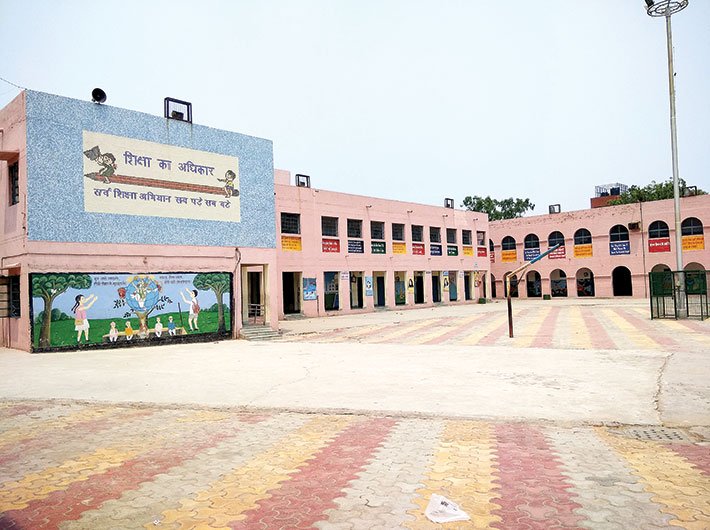Backed by the AAP government’s big hike in budget, Delhi’s state-run schools are performing better than even private schools in CBSE exams
Sarvodaya Co-Ed Senior Secondary School, Sultanpuri, emerged as one of the best performers among Delhi’s government schools in CBSE’s plus-two examinations. The school’s passing percentage shot up to 84.72 percent from last year’s 46.4 percent. It bagged 166 distinctions. School topper Surjeet Singh, from the commerce stream, has scored 95-plus in three major subjects. This year was the school’s first attempt in the science stream and the two students who opted for it came through with good marks.
The interior of the school – situated in a faraway corner of northwest Delhi – strikes a stark contrast with the grimy and cramped lane that leads to the school. Clean and spacious, the school campus has multi-coloured tiled ground, colourful walls, and inspirational messages painted on them.
The principal’s office, on the left, immediately past the gate, is equally vibrant, if not more, with orange and purple craft paper covering the rusty cupboards and still life drawings covering its walls. A rose bouquet rests on the glass-top table of the principal – Arvind Kumar, who brims with enthusiasm understandably.
“Tum samay ki ret par chhodate chalo nishaan; dekhati tumhe zameen, dekhata hai aasmaan (Leave your footprints on the track of time; the earth will watch you progress and so will the sky.)” These lines from an inspirational song by popular lyricist Saraswati Kumar Deepak are painted in red on one of the walls of Kumar’s office.
In May, when CBSE declared its results, government schools of Delhi left private schools behind for the second year in a row. Deputy chief minister Manish Sisodia, who is also in-charge of education, was quick to point out that the passing percentage of the Delhi government schools exceeds that of the private schools by nine percent. This development assumes significance, especially, because the Aam Aadmi Party (AAP) government has time and again highlighted its focus on the improvement of government schools. The government boasts of allocating the highest budget for education by any state government, which was 24 percent of the total outlay this year. With this step, the Delhi government’s education policy is being perceived as revolutionary. Although the higher spending on education and better passing percentage cannot be the sole parameters for analysing the government’s performance in the sector, it can be a sign of its step in the right direction. Has the AAP government succeeded in deciphering what afflicts the government schools in the capital?
Having completed two years, Kumar’s tenure as the principal of Sarvodaya school almost coincides with the government’s tenure in Delhi. It has been an eventful journey for both of them. Kumar admits that he was really apprehensive initially when he took over as the principal. The school did not have a good reputation then. “My initial six months here were extremely frustrating. Students at this age have uncontrollable energy and it’s really difficult to deal with the aggressive ones. There were incidents of rivalry and fights between the students, and it was really difficult to handle,” he says. Kumar had once accompanied a teacher to a police station as well, when some nasty students had allegedly pelted stones at the teacher’s car. “I was seriously considering requesting a transfer, but did not. This is the condition of most of the government schools,” he says.
There were several other problems he had to brace himself for. “Cleanliness was a huge problem. The campus remained filthy most of the times. Students of class XII had to sit on the floor as desks and chairs were not in ample number. Electricity and water supply were erratic. I wasted a lot of time on non-academic problems,” he says. However, the situation has improved remarkably now, according to Kumar, and he attributes a large part of the credit to the AAP government.
What has been done differently in Sarvodaya? Gajender Singh, an English teacher at the school, explains his strategy. “I knew that efforts have to be made consistently from our side as well as from students’ side. We had to ensure regular attendance of the students. We conducted several extra classes and worked especially on those students who were falling just short of passing marks. More and more practice was the only solution.”
Revision classes were held even during the board examinations, during the preparatory leave between the two papers. Tests were conducted throughout the year, apart from the regular semester and mid-semester exams. Kumar says, “I would never let any of the periods be an off period. If there is no teacher, I will go myself and teach the class.” Efforts of the teachers had started yielding results as the passing percentage showed a steady growth through the year, according to Kumar. “It was 39 percent in the first semester, went up to 51 percent in the mock exams, and was finally 71 percent for the pre-board examinations. I did expect a further increase in the board exams, and I turned out to be right,” he says.
According to the principal, the government has played an important role in the overall process. In his experience, the government has been receptive to his demands. “We have desks in surplus numbers now,” he says to cite an example.
In December 2015, the AAP government had announced its decision of appointing estate managers in the government-run schools. They would maintain and upgrade the building and ensure security. The responsibility earlier was with the head of school (HoS), principal or deputy director of education.
Kumar applauds this decision. “The estate manager, who is generally a retired officer or a teacher, inspects the state of the infrastructure, electricity supply, water supply etc. on a regular basis, and reports it to the government. It’s a huge burden off my shoulder. This has enabled me to focus on the real academic issues,” he says.
Agrees TS Panwar, vice principal of the RP Government Boys’ Senior Secondary School, (GBSSS), Rithala. This is another government school in the list of the stellar performers in Delhi, which has shown an increase of over 33 percent in its passing percentage. However, unlike Sarvodaya, GBSSS is still in need of better infrastructure. “Classes for standard XI and XII take place in the old sheds in the school premises. It is impossible to teach children in those sheds during the summer months. First three months of our academic year are simply wasted,” says Virender Kumar, a Hindi teacher from GBSSS.
However, Jaychandra Jha, a retired army officer, enjoys the reputation of a proactive and persuasive estate manager at the school. Panwar admits that the newly created position of the estate manager has offered him some relief. “A few classrooms have been constructed in the school last year. Jha has been assisting them in conducting surveys for the new classrooms to be built as well.” He sees some hope.
The responsibility of keeping the premises of the government schools clean has been handed over to private companies on a contractual basis. This is not the first time the government in the capital has adopted this practice. “However, the results on the ground are much more visible now. The schools are much cleaner. The credit can be given to the incumbent government for energising the whole system, giving the development a momentum, a push that was really the need of the hour,” says Kumar, the Hindi teacher.
Atishi Marlena, education adviser of the Delhi government, says that the government has pushed for better contracts with the sanitation companies with heavy penalties. “Overall, there’s far better monitoring and accountability in the system now. Usually, ministers go to schools just on the occasions when ribbons have to be cut, but that is not the case now. The education minister (Sisodia) pays surprise visits to government schools. Inspections are taking place on a regular basis. It helps in keeping the system on its toes,” she explains.
Meanwhile, government schools principals are undergoing leadership training at the various Indian Institutes of Management (IIMs). Some of them have even been sent for overseas training at places like University of Cambridge. Again, the AAP government does not get the credit for initiating these activities, but does score points for trying to make them more effective. Arvind Kumar, who has been part of the training at IIM Lucknow, admits that he has been able to find practical application of what he’s learnt at the training programmes.
Marlena says, “The previous government used to organise training programmes for teachers towards the end of the academic year. It was more of a formal activity conducted to exhaust the fund allocated for it. It didn’t have a practical purpose. Now, the teachers, including the guest teachers are undergoing training before the beginning of the academic year, so that it can be useful for the academic year ahead.”
In a first of its kind initiative, the government has made an attempt to unite the principals by forming groups of 10. They have been asked to meet on a regular basis to exchange inputs and work as a team.
Absenteeism is one of the major problems the government-run schools have to tackle with. Most of their students come from underprivileged backgrounds and some even do part-time jobs. “Families of many of these students do not always understand the importance of education. This is the case with many of the girls, whom their families want to marry off. We personally had to meet some of the parents and persuade them to let their daughters finish class XII at least,” says Kumar. However, the school management committees (SMCs) have been playing an active role in understanding students’ issues and helping them resolve those.
Appreciating SMCs, Kumar explains that the first step in the development of children in schools is to form an emotional bond with them, empathising with them, giving them the confidence that someone is standing by them. “They have a lot of issues. The most rowdy students can open up to you and listen to you if they believe that you genuinely want good things for them. We have to sometimes get involved in their personal lives and find solutions to their issues. SMC members are more than willing to help us with that. They’ve personally gone to students’ homes several times – trying to resolve their personal issues, and have helped us seek regular attendance from them,” he says.
Teachers at the GBSSS have similar views, and teachers from both the schools feel that a palpable outcome of the government’s efforts can be seen with this year’s CBSE results. “The efforts are, of course, visible. Although, the government still has to go a long way. The state of the government schools has been long neglected and this can be seen as just the beginning of the repair,” feels Panwar.
“It’ll take time. It’s a social movement after all. The important thing is that we don’t lose our momentum,” feels Ravinder Kumar.
pranita@governancenow.com
(The story appears in the June 16-30, 2017 issue of Governance Now)

